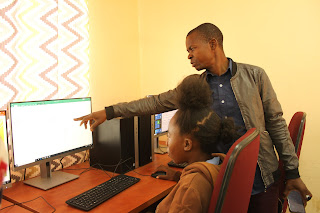Chisamba ICT Hub Boosts Digital Literacy
 |
| The ICT Hub has boosted digital literacy among girls at the learning institutions. |
Anne Chisanga moves the mouse from left to right as she skillfully designs a colourful pinkish pie chart on her computer.
She later fills it with various percentages representing sample data.
“I am practicing how to design a visual representation of data using a pie chart,” she confidently tells this Reporter.
The 15-year-old girl is a grade nine pupil at Chisamba Secondary School.
Anne reveals that she is taking advantage of the free internet connectivity in the computer laboratory at her school to build up on what she learns in class.
“Knowing how to operate a computer has improved my studies . I now use the internet to research further and add on to what I learn in class,” she says.
Next to her is Faith Sengula who is practicing how to enter figures in an excel sheet.
Faith says she has learnt how to type, design cards using word publisher, using excel and sending emails.
The 12-year-old states that being computer literate has given her confidence that she can excel in male - dominated fields such as Computer Science and Engineering.
“In the past, operating a computer was left to boys only and that made us miss out as girls. But with the setting up of this computer laboratory at my school, we all now have equal access,” Faith says.
Anne and Faith are among the learners at Chisamba Secondary School in Central Province who have acquired Information and Communication Technology (ICT) skills from the Chisamba ICT Hub which was commissioned in March, 2024.
 |
| Chisamba Secondary School pupils in the ICT Hub |
Zambia Information Communications Technology Authority (ZICTA) Corporate Communications Manager Hanford Chaaba explains that the initiative is aimed at bridging the gender digital gap by equipping girls and women with ICT skills.
Mr. Chaaba says the establishment of the ICT Hub is part of the joint programme between the Zambian Government and the United Nations on eradicating Online Gender Based Violence (OGBV) which was funded by the United Nations Development Programme (UNDP) through the Irish aid and Swedish aid.
He says the initiative was implemented by ZICTA with a view to fostering gender equality by promoting digital inclusion of girls and women in the community.
Mr. Chaaba adds that the purpose of the ICT Hub is also to raise awareness on online gender vices, mainly cyber bullying and harassment.
“The general objective of setting up the ICT Hub is the promotion of ICT education and training among girls and women in the beneficiary community thereby bridging the digital divide. Women usually shy away from technology hence we have brought technology on their doorstep,” he says.
At the moment, women from the community who wish to utilise the hub or acquire digital skills are being aided by three ICT teachers from Chisamba Secondary School.
 |
| Chisamba Secondary School ICT Teacher Kenny Chawe guides his pupil |
However, the community is in the process of constituting a committee of five members who are trained in ICT skills who will later take up the training role as per guidelines.
“The ICT Hub has 21 computers, a printer , two white boards and Wi-Fi. While learners are using it for computer studies, community members are using it for accessing information on government programmes, typing business proposals and also printing their documents for free among other uses,” Mr. Chaaba says.
He emphasises that boys and men are equally welcome to use the ICT Hub.
Under the same GRZ - UN OGBV programme which was implemented from January 2023 to March 2024, ZICTA set up ICT hubs in Itezhi Tezhi and Chongwe districts.
Additionally, ZICTA trained women in beneficiary communities on OGBV in order to equip them with knowledge of what it constitutes, reporting channels, and the legal framework.
Chisamba District Education Board Secretary (DEBS) Samuel Kunda says the ICT Hub has improved digital literacy among learners at Chisamba Primary and Chisamba Secondary schools.
Mr. Kunda notes that the ICT infrastructure has enhanced the delivery of the curriculum in relation to computer studies.
He explains that computer studies is now a compulsory and examinable subject, hence the establishment of the ICT Hub is essential in enabling learners acquire practical ICT skills.
“We have 1,205 pupils at the primary section and 843 secondary school pupils at the two institutions who are accessing the ICT Hub at different time slots. We previously used to face challenges in delivering computer lessons to learners due to inadequate computers. The ICT Hub has changed things for the better,” he says.
Noteworthy is that current worldwide technological advancements have widened the gap between the haves and have-nots especially in developing countries like Zambia.
These innovations have contributed to the exclusion of rural communities from accessing platforms that can enable them attain personal development and also accelerate social economic transformation in their communities.
This calls for strategies to ensure increased access to technology and innovations so as to promote digital inclusion in society.
The ICT Hub at Chisamba Secondary School is a step in the direction towards stimulating ICT inclusivity for girls and women who were previously marginalised.
This is in line with the United Nations Sustainable Development Goal number five which seeks to promote gender equality and reads in part, “ enhance the use of enabling technology, in particular information and communications technology, to promote the empowerment of women.”
It is hoped that the beneficiary community will continue to maximise the infrastructure to acquire ICT skills thereby spurring social economic development in the area.
This feature article was published in Zambia Daily Mail newspaper on 7th October, 2024.



Comments
Post a Comment